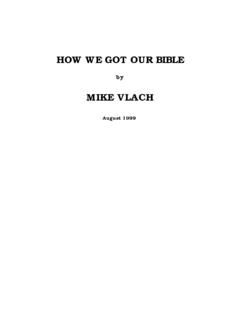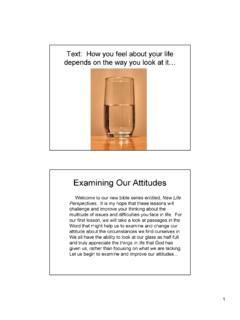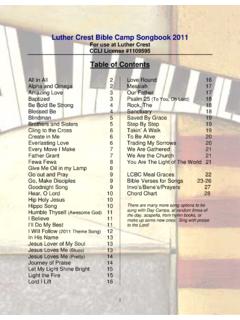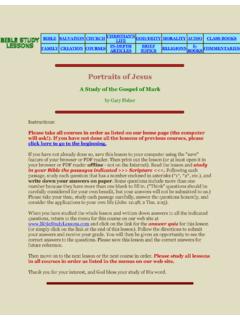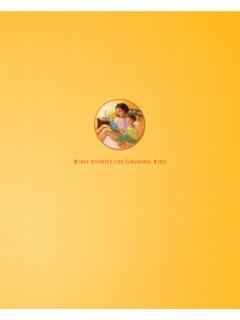Transcription of How We Got The Bible - Home Page On the Wing
1 How We Got The Bible John F. MacArthur, Jr. Ever since Eve encountered Satan's barrage of doubt and denial (Gen. 3:1-7), mankind has continued to question God's Word. Unfortunately, Eve had little or no help in sorting through her intellectual obstacles to full faith in God's self-disclosure (Gen. 2:16,17). Now the Scripture certainly has more than enough content to be interrogated, considering that it's comprised of 66 books, 1,189 chapters, 31,173 verses, and 774,746 words. When you open your English translation to read or study, you might have asked in the past or are currently asking, "How can I be sure this is the pure and true Word of God?
2 ". A question of this kind is not altogether bad, especially when one seeks to learn with a teachable mind (Acts 17:11). The Scripture invites the kinds of queries that a sincere student asks. A whole host of questions can flood the mind, such as: Where did the Bible come from? Whose thinking does it reflect? Did any books of the Bible get lost in time past? What does the Scripture claim for itself? Does it live up to its claims? Who wrote the Bible --God or man? Has Scripture been protected from human tampering over the centuries? How close to the original manuscripts are today's translations? How did the Bible get to our time and in our language?
3 Is there more Scripture to come, beyond the current 66 books? Who determined, and on what basis, that the Bible would be composed of the traditional list of 66 books? If the Scriptures were written over a period of 1,500 years (ca. 1405 to 95), passed down since then for almost 2,000 years, and translated into several thousand languages, what prevented the Bible from being changed by the carelessness or ill motives of men? Does today's Bible really deserve the title "The Word of God"? Undoubtedly, these questions have bombarded the minds of many. A study of the Scriptures alone settles all questions to the extent that there is no need to be bothered by them again.
4 Scripture gives this assurance. Scriptures' Self Claims Take the Bible and let it speak for itself. Does it claim to be God's Word? Yes! Over 2,000 times in the Old Testament alone, the Bible asserts that God spoke what is written within its pages. From the beginning (Gen. 1:3) to the end (Mal. 4:3) and continually throughout, this is what Scripture claims. The phrase "the Word of God" occurs over 40 times in the New Testament. It is equated with the Old Testament (Mark 7:13). It is what Jesus preached (Luke 5:1). It was the message the apostles taught (Acts 4:31; 6:2). It was the Word the Samaritans received (Acts 8:14) as given by the apostles (Acts 8:25).
5 It was the message the Gentiles received as preached by Peter (Acts 11:1). It was the word Paul preached on his first missionary journey (Acts 13:5,7,44,48,49; 15:35,36). It was the message preached on Paul's second missionary journey (Acts 16:32; 17:13; 18:11). It was the message Paul preached on his third missionary journey (Acts 19:10). It was the focus of Luke in the book of Acts in that it spread rapidly and widely (Acts 6:7; 12:24; 19:20). Paul was careful to tell the Corinthians that he spoke the Word as it was given from God, that it had not been adulterated, and that it was a manifestation of truth (2 Cor. 2:17; 4:2).
6 Paul acknowledged that it was the source of his preaching (Col. 1:25; 1 Thess. 2:13). Psalms 19 and 119, plus Proverbs 30:5-6, make powerful statements about God's Word which set it apart from any other religious instruction ever known in the history of mankind. These passages make the case for the Bible being called "sacred" (2 Tim. 3:15) and "holy" (Rom. 1:2). The Bible claims ultimate spiritual authority in doctrine, reproof, correction, and instruction in righteousness because it represents the inspired Word of Almighty God (2 Tim. 3:16,17). Scripture asserts its spiritual sufficiency, so much so that it claims exclusivity for its teaching (cf.)
7 Is. 55:11; 2. Pet. 1:3,4). God's Word declares that it is inerrant (Pss. 12:6; 119:140; Prov. 30:5a; John 10:35) and infallible (2 Tim. 3:16, 17). In other words, it is true and therefore trustworthy. All of these qualities are dependent on the fact that the Scriptures are God-given (2 Tim. 3:16; 2 Pet. 1:20,21), which guarantees its quality at the Source and at its original writing. In Scripture, the person of God and the Word of God are everywhere interrelated, so much so that whatever is true about the character of God is true about the nature of God's Word. God is true, impeccable, and reliable; therefore, so is His Word.
8 What a person thinks about God's Word, in reality, reflects what a person thinks about God. Thus, the Scripture can make these demands on its readers. So He humbled you, allowed you to hunger, and fed you with manna which you did not know nor did your fathers know, that He might make you know that man shall not live by bread alone; but man lives by every word that proceeds from the mouth of the Lord. Deut. 8:3. I have not departed from the commandment of His lips; I have treasured the words of His mouth more than my necessary food. Job 23:12. The Publishing Process The Bible does not expect its reader to speculate on how these divine qualities were transferred from God to His Word, but rather anticipates the questions with convincing answers.
9 Every generation of skeptics has assailed the self-claims of the Bible , but its own explanations and answers have been more than equal to the challenge. The Bible has gone through God's publishing process in being given to and distributed among the human race. Its several features are discussed below. Revelation God took the initiative to disclose or reveal Himself to mankind (Heb. 1:1). The vehicles varied;. sometimes it was through the created order, at other times through visions/dreams or speaking prophets. However, the most complete and understandable self-disclosures were through the propositions of Scripture (1 Cor.)
10 2:6-16). The revealed and written Word of God is unique in that it is the only revelation of God that is complete and that so clearly declares man's sinfulness and God's provision of the Savior. Inspiration The revelation of God was captured in the writings of Scripture by means of "inspiration." This has more to do with the process by which God revealed Himself than the fact of His self-revelation. "All Scripture is given by inspiration of God.." (2 Tim. 3:16) makes the claim. Peter explains the process, ".. knowing this first, that no prophecy of Scripture is of any private interpretation, for prophecy never came by the will of man, but holy men of God spoke as they were moved by the Holy Spirit" (2 Pet.
